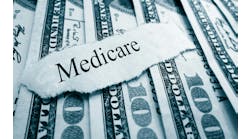Feds Arrest 35 in Fraudulent Genetic Testing Scheme
The Department of Justice (DOJ) has brought charges against 35 individuals who federal prosecutors attest fraudulently billed Medicare more than $2.1 billion for cancer genetic testing services.
The defendants, in five federal districts, were associated with dozens of telemedicine companies and cancer genetic testing laboratories; the DOJ said this is one of the largest healthcare fraud schemes ever charged. Among those charged on Sept. 27 were 10 medical professionals, including nine doctors.
The coordinated federal investigation targeted an alleged scheme involving the payment of illegal kickbacks and bribes by CGx laboratories in exchange for the referral of Medicare beneficiaries by medical professionals working with fraudulent telemedicine companies for expensive cancer genetic tests that were medically unnecessary, according to the DOJ.
The release from the department continued, “Often, the test results were not provided to the beneficiaries or were worthless to their actual doctors. Some of the defendants allegedly controlled a telemarketing network that lured hundreds of thousands of elderly and/or disabled patients into a criminal scheme that affected victims nationwide. The defendants allegedly paid doctors to prescribe CGx testing, either without any patient interaction or with only a brief telephonic conversation with patients they had never met or seen.”
More specifically, telemarketing companies would reach out to Medicare beneficiaries, allegedly telling them lies about free genetic testing services that would estimate seniors’ cancer risk or determine how well certain drugs would work for them. Scare tactics were included in the pitch, such as telling patients that if they didn't have the testing done they could end up suffering from a variety of possibly fatal conditions, according to a story in NPR.
The beneficiaries were told that they simply had to provide their Medicare information, a copy of their driver's license and a bit of DNA collected from a swab of saliva from inside their cheek. “Once recruiters got the information they wanted, they would try to get the patient's own healthcare provider to write a prescription for the test. If that didn't work, the recruiters asked one of their own cadre of doctors to write prescriptions for patients they didn't know,” according to NPR.
The money was made via Medicare reimbursements—thousands of dollars of payments that would be split between the worker who recruited the patient, the doctor writing the prescription, the lab that did the test and the telemarketing company that organized the alleged scheme, according to the report. And often, the labs didn't even send results to patients.
Assistant Attorney General Brian A. Benczkowski of the Justice Department’s Criminal Division said in a statement, “These defendants allegedly duped Medicare beneficiaries into signing up for unnecessary genetic tests, costing Medicare billions of dollars. Together with our law enforcement partners, the Department will continue to protect the public fisc and prosecute those who steal our taxpayer dollars.”
The DOJ’s Criminal Division, together with the U.S. Department of Health and Human Services Office of the Inspector General (HHS-OIG) and FBI spearheaded last week’s investigation and prosecution that resulted in charges against CEOs, CFOs and others.
In addition, the Centers for Medicare & Medicaid Services, Center for Program Integrity (CMS/CPI), announced that it took adverse administrative action against cancer genetic testing companies and medical professionals who submitted more than $1.7 billion in claims to the Medicare program.
CMS Administrator Seema Verma said that to prevent additional financial losses, the federal agency “has taken swift action to protect the Medicare Trust Funds from the providers who allegedly have fraudulently billed over $1.7 billion.”
U.S. Attorney Peter G. Strasser for the Eastern District of Louisiana, noted, “The defendants allegedly targeted elderly, disabled and other vulnerable consumers, luring them into this fraudulent scheme that affected victims nationwide and generated losses in excess of one billion dollars which spanned multiple jurisdictions. Schemes such as these have a profound effect on our nation, not only by the monies lost in the scheme, but also by stoking public distrust in some medical institutions.”
If convicted, the defendants arrested could face decades in prison.

